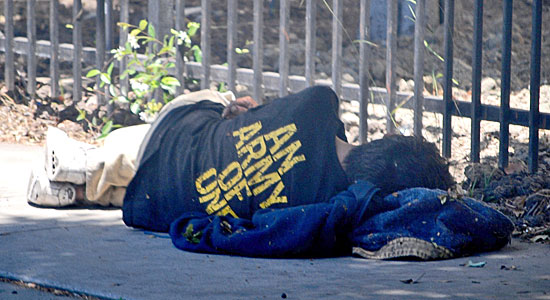A breakthrough for vets
August 2, 2013
A few years ago, I was participating in the county’s biannual homeless census when I came upon a man sleeping under a bush on La Brea Avenue. It was winter, about 4 a.m. The man had been on the streets for ages. He shivered awake, and we talked for a few minutes, his breath steaming the night air, his clothing disheveled. Among other things, he told me he was a veteran.
That conversation was as heartbreaking as it was emblematic. More than 6,000 of Los Angeles County’s homeless are former military servicewomen and servicemen. Once, they volunteered to give their lives for their country. Now they wander our streets, their minds and bodies often addicted or damaged, their chances higher than average of ending up in the ranks of long-term street people at massive public expense.
That’s why, two years ago, we partnered with the Department of Veterans Affairs to launch a pilot program, a spinoff of our successful Project 50, to provide permanent supportive housing for a group of veterans identified as most likely to die on the streets.
There were 60 to start, severely mentally ill and chronically homeless. And, as with Project 50 on Skid Row, our veterans initiative, dubbed Project 60, started with the premise that if you give someone housing first—no moralizing, no demanding that they get a job or sober up as a condition of shelter—they’ll be more amenable to any medical, mental health or substance abuse treatment services you offer. That, in turn, will spare taxpayers the much higher cost of housing them in hospitals and jails.
It was a novel idea, and today, I am thrilled to report that it has paid off.
This week, during a meeting in Washington, D.C., with U.S. Sen. Dianne Feinstein, Rep. Henry Waxman and myself, Secretary of Veterans Affairs Eric Shinseki committed to dramatically scaling up the program, which, according to this year’s homeless census, contributed to a stunning 23% drop in the number of homeless vets over the last two years in Greater Los Angeles.
The VA’s commitment—part of the Secretary’s long-stated goal of ending homelessness among veterans by 2015—will fund and support a sweeping expansion of homeless services for veterans in L.A. County, from housing vouchers to medical outreach to a dedicated homeless services center at the West Los Angeles VA facility.
In all, it will allow us to house and treat more than ten times as many homeless vets in the next two years as we did over the last two. During this period, we expect to house 1,320 chronically homeless veterans. This represents the single most significant development on this issue in years.
It’s also the result of a lot of hard work and collaboration by Sen. Feinstein, Rep. Waxman and staff including Donna Beiter, who directs the VA’s Greater Los Angeles Healthcare System, the VA’s Michelle Wildy, Flora Gil Krisiloff in my office, Mary Marx with our county Department of Mental Health and front-line nonprofits Ocean Park Community Center in Santa Monica, St. Joseph Center in Venice, San Fernando Valley Mental Health Center and the Hollywood branch of Step Up on Second.
And it’s proof that when we build on our successful programs, we can make a life-saving difference. We have helped nearly 120 homeless mentally ill veterans through our original Project 60: a sailor who spent the past 15 years sleeping in a Santa Monica park and making monthly emergency room visits until he got housing; a former Marine who, after a decade, has begun to get sober in her Gardena apartment; a Vietnam vet, dying of cancer in a hospice, who came in from the night in time to make peace with his anguished family. Now the number being cared for will dramatically increase.
These veterans answered the call of our country when we needed them. Now they need us, and this week marks a huge breakthrough in helping Los Angeles answer that call.
Posted 8/3/13













 405 bridge work causes a stink
405 bridge work causes a stink





